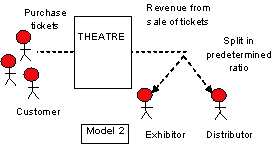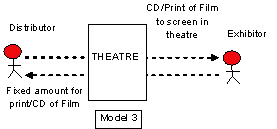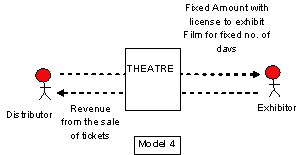Media HotlineFebruary 26, 2009 From Oscars To Tax Exemptions - Bollywood Gets It All!On February 23, 2009, the Indian Film Industry was in high spirits regaling in the glory of the Oscars when the Central Board of Excise and Customs (“CBEC”) decided to make its own contribution to the occasion - no more service tax on movie theatres! On the same day, CBEC issued a clarification stating that service tax is not leviable on the amounts received by the theatre owners from the film distributors for screening of the films except when they provide the film distributors with “Business Support Services”. Business Support Services is a generic service provided to support the business or commerce of the service receiver. But can an exhibition of a movie be regarded as a support service? This interpretation differs depending upon the Distributor-Exhibitor arrangement. TYPICAL DISTRIBUTOR-EXHIBITOR ARRANGEMENTSUsually, movie producers sell film rights regionally to distributors, who in turn enter into different types of agreements/arrangements with theatre owners (also known as “Exhibitors") in their region. There are four typical arrangements that have been illustrated below.
Under Model 1, the distributor leases the movie halls from the theatre owners for screening the movie for a fixed rent, and bears all profits and losses. According to the clarification issued by CBEC the service provided by theater owners under Model 1 is liable to service tax, as it is categorized as “renting of immovable property for furtherance of business or commerce”. Whereas, under Model 4 (most commonly used model), the theatre owners have a license to screen the movie for a fixed number of days and the proceeds from the sale of the tickets go to the distributor. There is no rental arrangement under this model and the exhibitor receives a fixed amount for the number of days the film is screened irrespective of whether the movie does well or not at the box office. The factor differentiating the two models is that in Model 1 the theatre is lent by the Exhibitor while in the Model 4 the Exhibitor gets a license to exhibit. Model 2 is a principal to principal arrangement under which the revenue from the ticket sales is split between the distributor and exhibitor in a predetermined ratio. Model 3 is an arrangement where the theatre owner buys the print/CD of the movie on payment of a fixed price and subsequently screens it in his theatre/s. The CBEC has clarified that under Models 2, 3, and 4 the exhibitor is undertaking a separate activity and not providing any support or assistance services and therefore the Exhibitor is not subject to service tax in India. CONCLUSIONThe interpretation of this Circular may be extended beyond screening of movies to cover the proposed screening of IPL cricket matches or any content in the theatres as well. On the whole, the interpretation of the CBEC Circular hits the nail and has relieved the distributors and exhibitors from the service tax net. Source: Circular No. 109/03/2009, Dated February 23, 2009, issued by Ministry of Finance Department of Revenue (Central Board of Excise and Customs), http://www.servicetax.gov.in/circular/st-circular09/st-circ-109-2k9.htm DisclaimerThe contents of this hotline should not be construed as legal opinion. View detailed disclaimer. |
|

On February 23, 2009, the Indian Film Industry was in high spirits regaling in the glory of the Oscars when the Central Board of Excise and Customs (“CBEC”) decided to make its own contribution to the occasion - no more service tax on movie theatres! On the same day, CBEC issued a clarification stating that service tax is not leviable on the amounts received by the theatre owners from the film distributors for screening of the films except when they provide the film distributors with “Business Support Services”. Business Support Services is a generic service provided to support the business or commerce of the service receiver. But can an exhibition of a movie be regarded as a support service? This interpretation differs depending upon the Distributor-Exhibitor arrangement.
TYPICAL DISTRIBUTOR-EXHIBITOR ARRANGEMENTS
Usually, movie producers sell film rights regionally to distributors, who in turn enter into different types of agreements/arrangements with theatre owners (also known as “Exhibitors") in their region. There are four typical arrangements that have been illustrated below.




Under Model 1, the distributor leases the movie halls from the theatre owners for screening the movie for a fixed rent, and bears all profits and losses. According to the clarification issued by CBEC the service provided by theater owners under Model 1 is liable to service tax, as it is categorized as “renting of immovable property for furtherance of business or commerce”. Whereas, under Model 4 (most commonly used model), the theatre owners have a license to screen the movie for a fixed number of days and the proceeds from the sale of the tickets go to the distributor. There is no rental arrangement under this model and the exhibitor receives a fixed amount for the number of days the film is screened irrespective of whether the movie does well or not at the box office. The factor differentiating the two models is that in Model 1 the theatre is lent by the Exhibitor while in the Model 4 the Exhibitor gets a license to exhibit.
Model 2 is a principal to principal arrangement under which the revenue from the ticket sales is split between the distributor and exhibitor in a predetermined ratio. Model 3 is an arrangement where the theatre owner buys the print/CD of the movie on payment of a fixed price and subsequently screens it in his theatre/s. The CBEC has clarified that under Models 2, 3, and 4 the exhibitor is undertaking a separate activity and not providing any support or assistance services and therefore the Exhibitor is not subject to service tax in India.
CONCLUSION
The interpretation of this Circular may be extended beyond screening of movies to cover the proposed screening of IPL cricket matches or any content in the theatres as well. On the whole, the interpretation of the CBEC Circular hits the nail and has relieved the distributors and exhibitors from the service tax net.
Source: Circular No. 109/03/2009, Dated February 23, 2009, issued by Ministry of Finance Department of Revenue (Central Board of Excise and Customs), http://www.servicetax.gov.in/circular/st-circular09/st-circ-109-2k9.htm
- Ranjana Adhikari & Rajesh Simhan
Disclaimer
The contents of this hotline should not be construed as legal opinion. View detailed disclaimer.
Research PapersCompendium of Research Papers Third-Party Funding for Dispute Resolution in India Opportunities in GIFT City |
Research Articles |
AudioThe Midnight Clause |
NDA ConnectConnect with us at events, |
NDA Hotline |
VideoCyber Incident Response Management Webinar : Navigating Advertising Laws in India Part II Fireside Chat with Manisha Kapoor Webinar : Navigating Advertising Laws in India |
